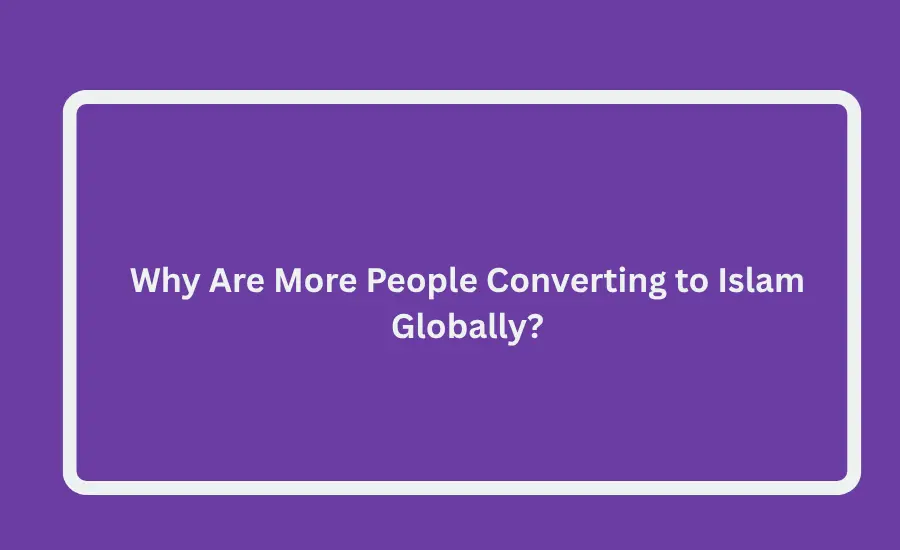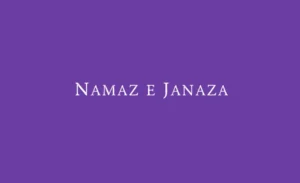In recent years, Islam has become one of the fastest-growing religions in the world, attracting people from every culture, background, and profession. From scientists and scholars to artists and everyday individuals, countless men and women are embracing Islam; each with a unique story, yet united by a shared sense of truth, peace, and purpose.
According to global studies and research by the Pew Research Center, the Muslim population is projected to grow faster than any other major religious group, driven not only by birth rates but by a rising number of converts to Islam. This surge in conversions raises a powerful question: Why are more people converting to Islam globally?
For many, the answer lies in the spiritual depth, intellectual clarity, and moral beauty of Islam. Its message of Tawḥīd (the Oneness of God) resonates deeply with those seeking a pure, unaltered faith. Others are drawn to Islam’s comprehensive way of life, one that balances spiritual devotion with social justice, compassion, and discipline. In a world overwhelmed by materialism, uncertainty, and moral confusion, Islam offers guidance, serenity, and direction rooted in divine wisdom.
This article explores the growing appeal of Islam worldwide, highlighting the spiritual, intellectual, and social reasons behind the rise in conversions. Through Qur’anic insights, Prophetic traditions, and real-world reflections, we uncover why hearts across the globe continue to find their peace in the timeless message of Islam.
Global Statistics & Trends on People Converting to Islam
Across the world, Islam continues to grow, not just through birth rates, but also through an increasing number of conscious conversions. From North America to Europe, and Asia to the Middle East, people are embracing Islam for its clarity, purpose, and deep spiritual truth. Below are some verified statistics and insights that help understand this global shift.
1. Global Growth of Islam
According to the Pew Research Center (2025), between 2010 and 2020, the global Muslim population increased by over 347 million people, making Islam the fastest-growing major religion in the world. While much of this growth is due to demographic factors, an increasing portion is attributed to conversions, especially in non-Muslim-majority countries.
2. Conversions in the United States
In the United States, about 20% of American Muslims today are converts; individuals who were raised in another religion or no religion before embracing Islam – source: Pew Research Center, “Religious Switching Into and Out of Islam,” 2025.
Many American converts cite Islam’s monotheism (Tawḥīd), spiritual discipline, and logical framework of life as major reasons for their acceptance of the faith. Notably, Islam has become the fastest-growing religion among African-Americans and young professionals seeking truth and identity.
3. United Kingdom
Islam is the second-largest religion in the UK, and conversion numbers have been steadily increasing. Research indicates around 5,000 new converts each year, with cumulative estimates exceeding 100,000 British converts over the past decade. Many British converts highlight Islam’s strong sense of community, equality, and morality. offering a counterbalance to growing materialism and loneliness in modern society.
4. Conversions Across Europe
Across Germany, around 4,000 people embrace Islam every year, while in France, some estimates suggest 30,000–50,000 converts. It is that Islam’s message resonates strongly in Europe, particularly among youth and women seeking meaning beyond secular modernism.
5. Rising Conversions in the Middle East
In the UAE, Islam’s universal message continues to inspire expatriates and visitors. In Dubai alone, more than 3,600 people embraced Islam in the first half of 2025. a record-breaking figure according to the Dubai Islamic Affairs Department. These conversions often occur after personal study, interaction with Muslim colleagues, or witnessing the hospitality and humility of Muslims firsthand.
6. Japan and East Asia
Although Islam remains a minority faith in Japan, the number of Japanese Muslims is steadily growing. Some local reports claim that tens of thousands have accepted Islam over the past decade, inspired by travel, education abroad, or exposure to global events showcasing Islam’s message of peace and justice. While official data is limited, Japan’s Muslim population continues to rise quietly yet steadily.
7. Conversions in India
In India, conversions to Islam have been documented for centuries; from spiritual seekers to oppressed communities finding empowerment in Islamic equality. While official figures are not published due to political sensitivities, anecdotal and community data suggest a continuous stream of individuals embracing Islam, particularly among Dalits and educated youth seeking justice, unity, and monotheism.
8. Post-Gaza War Surge in Conversions
After the 2023 Gaza war and subsequent humanitarian crises, a surge in conversions was reported across Europe, the U.S., and online platforms. Some media outlets reported up to a 400% increase in people embracing Islam since the conflict began.
Numerous mosque leaders and Islamic centers across the West have reported an unprecedented rise in shahadahs (testimonies of faith); many driven by people witnessing Muslim resilience, compassion, and unwavering faith amid global injustice.
9. Top Reasons behind the Conversions
When asked why they embraced Islam, converts across different regions consistently mention:
- Discovering the truth through reading the Qur’an and studying the Prophet Muhammad ﷺ’s life.
- Finding peace, purpose, and structure in daily prayer and belief in one God.
- Seeking spiritual purity and moral clarity in a confused modern world.
- Being moved by the unity, discipline, and compassion of Muslims, especially during times of hardship like the Gaza crisis.
10. Summary of Global Conversion Trends
Below table represents the summary of global Islamic conversion trends:
| Region / Country | Estimated Converts / Trend | Source & Reliability |
| Global (2010–2020) | +347 million Muslims (growth, partly conversions) | Pew Research Center |
| United States | 20% of Muslims are converts | Pew Research Center |
| United Kingdom | ~5,000 per year | IslamHouse / UK Surveys |
| Germany | ~4,000 per year | Islam Message |
| France | 30,000–50,000 total | Islam Message |
| UAE (Dubai) | 3,600 in first half of 2025 | Times of India |
| Japan | Tens of thousands | NewsToday.org |
| Europe (post-Gaza) | 400% increase claimed | Muslim Times / Suno News |
| India | Ongoing conversions, unrecorded | Community reports |
11. Understanding the Broader Picture
While some of these statistics are approximations, the pattern is undeniable: Islam continues to touch hearts worldwide. Conversions often come not from pressure, but from spiritual reflection, intellectual conviction, and witnessing truth in action.
“When the truth comes, falsehood perishes, for falsehood is bound to perish.” – (Qur’an 17:81)
The rise in conversions highlights a growing awareness that Islam is not a religion of conflict but of clarity, justice, and peace.
Key Reasons People Convert to Islam
Here are the major factors, supported by Qurʾanic verses, Hadith, and scholarly reflection, explaining why many people find Islam compelling enough to adopt it:
1. The Message of Monotheism & Clarity of Belief (Tawheed)
Islam’s doctrine of Tawḥīd (Oneness of God) is simple, profound, and logical. Many converts report that Islam’s monotheism, without intermediaries or multiplicity in Godhead, addresses spiritual questions they had in other faiths or in secular contexts. Relevant Qurʾanic Ayat:
Arabic:
﴿ فَذَكِّرْ إِنَّمَا أَنتَ مُنذِرٌ وَّلَا عَلَيْكَ حِسَابُهُمْ ۚ إِلَّا مَن تَوَلَّىٰ وَكَفَرَ ﴾
Transliteration: “Fa-dhakkir innama anta mundhiru wa-la ʿalayka ḥisabuhum illa man tawalla wa kafar.”
Translation: “So remind, [O Muḥammad]; you are only a warner. You are not over them a controller. Except for those who turn away and disbelieve.” – Qurʾan 88:21-22
This, among many verses, emphasizes that guidance (and belief) is a personal matter; conviction arises from the heart and intelligence.
2. Eloquence, Language, and Miracles of the Qurʾan
Many are struck by the linguistic beauty, poetic structure, depth of meaning, preservation, and what they perceive as scientific or knowledge-miracles in the Qurʾan. These features lead to reflection, doubt of prior assumptions, and eventually acceptance.
- The Qurʾan challenges people to reflect: “Do they not reflect? There is no madness in their companion (Muḥammad). He is but a plain warner.” (Qurʾan 7:184)
- Also, many new Muslims say that reading Qurʾan translations opened their eyes.
3. Search for Spiritual Peace, Inner Contentment & Structure
Modern life, with its rapid pace, materialism, moral relativism, and social disconnect, often leaves people spiritually unfulfilled. Islam offers:
- Five daily prayers (Ṣalah) that structure the day with remembrance of God.
- Clear ethical guidelines: honesty, justice, humility, charity, modesty.
- Community (ummah) and brotherhood/sisterhood.
These help many converts find stability, purpose, and peace.
4. Universal Equality & Social Justice
Islam’s messages about equality before God, caring for the poor, opposing oppression, forbidding racial/tribal/arbitrary discrimination, often attract those who have experienced injustice or feel marginalized. The Qurʾan says: Arabic:
﴿ يَا أَيُّهَا النَّاسُ إِنَّا خَلَقْنَاكُم مِّن ذَكَرٍ وَأُنسَىٰ وَجَعَلْنَاكُمْ شُعُوبًا وَقَبَائِلَ لِتَعَارَفُوا ۚ إِنَّ أَكْرَمَكُمْ عِندَ اللَّهِ أَتْقَاكُمْ ۚ إِنَّ اللَّهَ عَلِيمٌ خَبِيرٌ ﴾
Transliteration: “Ya ayyuha-n-nasu inna khalaqnakum min dhakarin wa unsa wa jaʿalnakum shuʿūban wa qabaʾila litaʿarafū; inna akramakum ʿinda Llahi atqakum; inna Llaha ʿAlīmun Khabīr.”
Translation: “O mankind, indeed We have created you from a male and a female and made you peoples and tribes that you may know one another. Indeed, the most noble of you in the sight of Allah is the most righteous of you. Indeed, Allah is Knowing and Acquainted.” – Qurʾan 49:13
This sense of justice and dignity is profound for many converts.
5. Intellectual Reasoning, Critical Thought & Authenticity
Many converts emphasize that Islam satisfies their intellectual questions: about purpose, existence, morality, origin of life, afterlife. Compared to some belief systems they felt were based on tradition, culture, or unexamined authority, Islam’s encouragement to reason, to seek knowledge, to question, and to reflect is a strong pull.
6. The Role of Dawah, Personal Relationships & Online Media
- Meeting kind, practicing Muslims, seeing their character, seeing how Islam is lived in daily life often influences people more than lectures or formal preaching. Compassion, hospitality, example matter.
- Internet, social media, YouTube, online Qurʾan translations, podcasts, interfaith dialogue have lowered the barrier for people to access Islamic knowledge. Controversy and misrepresentation sometimes lead people to investigate Islam deeply.
7. The Practicality & Wholeness of Islamic Ethics and Law
Islam provides guidance in every aspect of life: individual, social, financial, political, etc. Many converts are drawn to how Islam addresses all dimensions: from family, diet, dress code, justice, to environmental care. They see it not as a religion for Sundays only, but a way of life.
What Islam Says: Verses & Hadith on Guidance, Invitation & Truth
To understand why Islam spreads or why people accept it, it helps to see what the Qurʾan and Sunnah themselves say about guidance, invitation to truth, and human choice.
Important Ayat
1. Qurʾan 16:125
Arabic:
﴿ ادْعُ إِلَى سَبِيلِ رَبِّكَ بِالْحِكْمَةِ وَالْمَوْعِظَةِ الْحَسَنَةِ ۖ وَجَادِلْهُم بِالَّتِي هِيَ أَحْسَنُ ۚ إِنَّ رَبَّكَ هُوَ أَعْلَمُ بِمَنْ ضَلَّ عَن سَبِيلِهِ وَهُوَ أَعْلَمُ بِالْمُهْتَدِينَ ﴾
Transliteration: “Udʿu ila sabīli rabbika bil-ḥikmati wal-mawʿiẓati al-ḥasanati wa jadilhum bi-allatī hiya aḥsanu; inna rabbaka huwa aʿlamu biman ḍalla ʿan sabīlihi wa huwa aʿlamu bil-muhtadīn.”
Translation: “Invite to the way of your Lord with wisdom and good instruction, and argue with them in a way that is best. Indeed, your Lord is most knowing of who has strayed from His way, and He is most knowing of who is [rightly] guided.”
2. Qurʾan 41:33
Arabic:
﴿ وَمَنْ أَحْسَنُ قَوْلًا مِّمَّنْ دَعَا إِلَى اللَّهِ وَعَمِلَ صَالِحًا وَقَالَ إِنَّنِي مِنَ الْمُسْلِمِينَ ﴾
Transliteration: “Wa-man aḥsanu qawlan mimman daʿa ila Allahi wa ʿamila ṣaliḥan wa qala innanī mina al-muslimīn.”
Translation: “And who is better in speech than one who calls to Allah and does righteous deeds and says, ‘Indeed, I am of the Muslims.’”
3. Qurʾan 2:256
Arabic:
﴿ لَا إِكْرَاهَ فِي الدِّينِ ۖ قَد تَّبَيَّنَ الرُّشْدُ مِنَ الْغَيِّ ۚ فَمَن يَكْفُرْ بِالطَّاغُوتِ وَيُؤْمِنْ بِاللَّهِ فَقَدِ اسْتَمْسَكَ بِالْعُرْوَةِ الْوُثْقَىٰ لَا انفِصَامَ لَهَا ۗ وَاللَّهُ سَمِيعٌ عَلِيمٌ ﴾
Transliteration: “La ikraha fi-d-dīn; qad tabayyana r-rushdu mina-l-ghayyi; faman yakfur bi-ṭ-ṭaghūti wa yu’min bi-Allahi faqad istamsaka bil-ʿurwati l-wuthqa; la infiṣama laha; wa Allahu Samīʿun ʿAlīm.”
Translation: “There shall be no compulsion in [acceptance of] the religion. The right way has become clear from the wrong. So whoever disbelieves in Ṭaghūt and believes in Allah has certainly grasped the most trustworthy handhold with no break in it. And Allah is Hearing and Knowing.”
Selected Hadiths
1. “Convey from me even one verse.”
Arabic: “بَلِّغُوا عَنِّي وَلَوْ آيَةً”
Transliteration: “Ballighū ʿannī walaw ayah.”
Source: Ṣaḥīḥ al-Bukharī (Hadith No. 3461) and also in other collections.
Meaning: Even if a person shares only one verse of the Qurʾan, they are fulfilling part of the duty of daʿwah (invitation to Islam).
2. “Whoever calls to guidance will have a reward similar to that of those who follow it…”
Arabic: “مَنْ دَعَا إِلَى الهُدَىٰ كَانَ لَهُ مِنَ الأَجْرِ مِثْلُ أُجُورِ مَنْ تَبِعَهُ لَا يَنْقُصُ ذَلِكَ مِنْ أُجُورِهِمْ شَيْئًا”
Transliteration: “Man daʿa ila al-huda kana lahu mina al-ajr miṯlu ujūri man tabiʿahu la yanquṣu dhalika min ūjūrihim shay’an.”
Source: Ṣaḥīḥ Muslim (Hadith 2674)
Meaning: The one who invites others to good guidance will get a reward equal to that of those who follow that guidance, without detracting from their (the followers’) reward.
Barriers & Why Not Everyone Converts
It’s also important to recognize what prevents people from converting:
- Lack of knowledge, misconceptions about Islam
- Fear of social rejection, family or cultural pressure
- Misrepresentation in media
- Language and cultural differences
- Confusion between Islam as religion and culture
Understanding both the attractions and obstacles gives a fuller picture.
How Islam Encourages Spreading the Truth
Islam does not force conversion, it emphasizes truth, freedom of conscience, and honest invitation.
- “Let there be no compulsion in religion…” (Qurʾan 2:256) shows that belief must be sincere, not coerced.
- Muslims are commanded to invite others with wisdom, gentleness, and fair argument.
- The reward is substantial for those who guide others, but acceptance is ultimately from Allah.
Implications: What Converts & Muslim Communities Often Experience
- Converts often undergo a process of learning: understanding prayer, rituals, basic beliefs.
- They may face difficulties: family or community misunderstanding, changes in identity.
- Support structures (learning circles, Muslim friends, mentors) are crucial.
Conversely, communities benefit when they maintain outreach, integrity, and ethics; not just mission, but exemplary character.
Suggestions for Improvement & Support for Muslim Converts
- Establish Dedicated Convert Support Programs: Mosques and Islamic centers should create structured mentorship and educational programs for new Muslims covering prayer, Qur’ān, community life, and Islamic ethics in a welcoming environment.
- Promote Cultural Sensitivity: Encourage existing Muslims to distinguish between Islam and culture. Islam is universal; new Muslims should not feel pressured to adopt foreign customs unrelated to the faith.
- Build Social Support Networks: Create inclusive circles, regular gatherings, and family-style events to help converts form strong friendships and a sense of belonging.
- Offer Psychological & Emotional Guidance: Partner with Muslim counselors or mentors who can help converts navigate family pressure, loneliness, and post-conversion adjustments with compassion.
- Encourage Knowledge & Empowerment: Provide accessible learning resources both online and in-person so new Muslims can build firm foundations in belief, worship, and identity.
- Model Prophetic Compassion: The Prophet ﷺ treated new Muslims with gentleness, encouragement, and mercy. Reviving this Prophetic approach ensures that every convert feels valued and uplifted.
Understanding the Global Shift Toward Islam
More people are converting to Islam globally because Islam offers a combination of:
- Clear, logical, and meaningful belief system (Tawḥid)
- Structure, discipline, and spiritual peace in a fast-changing world
- A universal message of equality and justice
- Intellectual satisfaction and encouragement to reflect
- Compassionate invitations, community support, and accessible knowledge
While numbers themselves are not the purpose of Islam, the trend reflects many individuals’ search for truth, purpose, belonging, and peace. People have a deep yearning for truth, balance, and spiritual fulfillment in a chaotic world. As hearts seek clarity and purpose, Islam’s message of oneness, justice, and peace continues to resonate across cultures and continents. This growing shift is not merely a trend, it is a profound return to faith, guided by divine wisdom and the universal call of Allah ﷻ.
Frequently Asked Questions (FAQs)
Why are so many people converting to Islam today?
Many people are embracing Islam because of its clear belief in the Oneness of God (Tawḥid), its balance between spirituality and daily life, and its message of peace, equality, and purpose. Islam offers answers to the moral, emotional, and intellectual questions that modern society often leaves unresolved.
What attracts people the most about Islam?
Converts often mention the simplicity of faith, the beauty of the Qur’an, and the sense of peace found in prayer and submission to Allah ﷻ. They are also inspired by the Prophet Muhammad ﷺ’s compassion, justice, and timeless teachings that remain relevant across every culture.
Is Islam the fastest-growing religion in the world?
Yes. According to multiple studies, including research by the Pew Research Center, Islam is the fastest-growing major religion globally. This growth is fueled by both natural population increase and a significant number of conversions, especially in North America and Europe.
What challenges do new Muslims face after converting?
Many new Muslims face emotional and social challenges, such as family pressure, cultural adjustments, or lack of community support. However, with proper guidance, mentorship, and understanding from Muslim communities, these challenges can turn into opportunities for stronger faith and growth.
Do people convert to Islam for marriage or genuine faith?
While some may initially explore Islam due to relationships, the majority of converts remain committed because of personal conviction. Once they study Islam’s teachings and experience its spiritual depth, their faith becomes independent and heartfelt.
How can Muslim communities better support converts?
Communities can help by offering education programs, mentor systems, and inclusive spaces where converts feel welcome and respected. Showing empathy, patience, and Prophetic kindness is key to nurturing their spiritual journey.
Does Islam force people to convert?
Absolutely not. Islam clearly states: “َا إِكْرَاهَ فِي الدِّينِ” – “There is no compulsion in religion.” (Qur’an 2:256). Faith must come from the heart, through free choice and sincere belief, not pressure or coercion.
What can someone do if they’re interested in learning more about Islam?
Start by reading the Qur’an with translation, listening to trusted Islamic scholars, and visiting a local mosque. Engaging with Muslims who embody the faith’s values of kindness and humility often provides the most authentic understanding.






